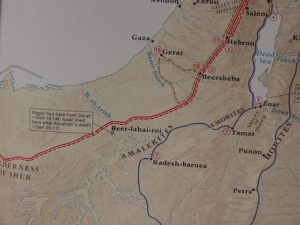
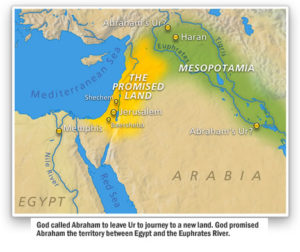
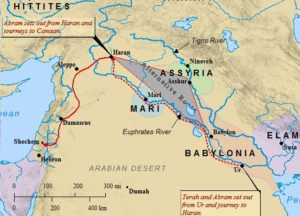
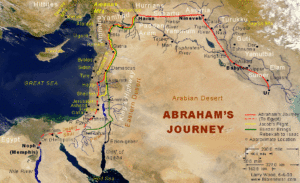
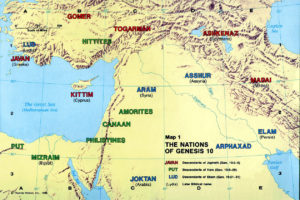
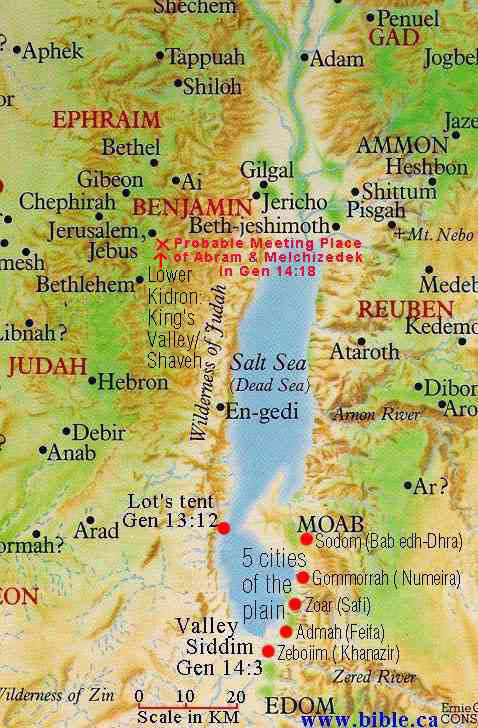
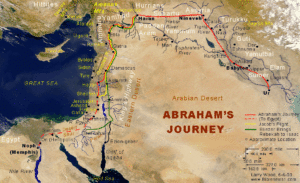
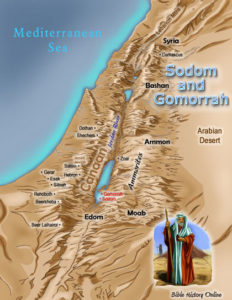
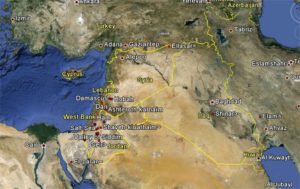
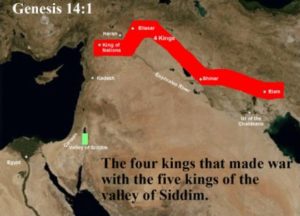
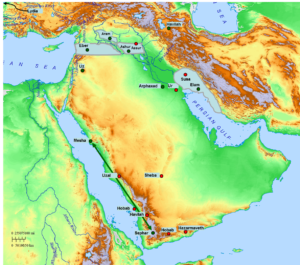
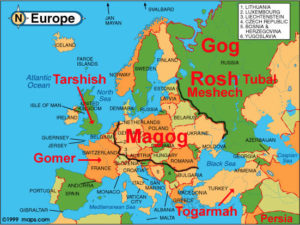
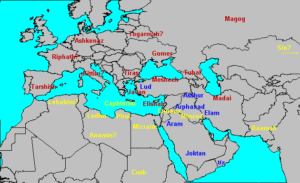













25
Abraham again took a wife, and her name was keturah.
Keturah: (H6989), קטוּרה: qeṭûrâh
BDB Definition: Keturah = “incense”
1) wife of Abraham after Sarah’s death
Most commentaries believe that Abraham married Keturah while Sarah was still alive because of his age. Abraham was 137 when Sarah passed away, and the reasoning giving for their belief is That he was too old to perform the duties required to have more children. I personally don’t agree with this supposition. I believe that just as God visited both Sarah and Abraham, and rejuvenated them according to the time of life, in which male and female were in their prime to have children, God was still blessing Abraham and fulfilling His promise to make Abraham’s descendants as the sand of the sea, and the stars in the heavens (Gen 22:17). In 1 Ch 1:32 we are told that Keturah was a concubine of Abraham’s. And when we read closely we see that she is Abraham’s concubine, not one of Sarah’s handmaidens, as Hagar is described in Genesis; as being a handmaid of Sarah’s, which in essence the same thing.
2 And she bore him Zimran, Jokshan, Medan, Midian, Ishbak, and Shua. 1Chr. 1:32, 33
Like I have said before, God found it relevant to give us the names of the children of Keturah who bore them to Abraham, then I will list them one by one and show the definition of these names in the Hebrew meaning. In the bible, names are very important, sometimes in helping us to understand prophecy, and also in geographical locations, and then to also show the character of the person. Now I don’t know what relevance these names are to us who read the bible but God does. So here we go, and I may learn something now or in the future readings that I can go back and say to myself, “Oh now I get it”
Zimran: (H2175), זמרן: zimrân
BDB Definition: Zimran = “musician”
1) the eldest son of Abraham by Keturah
Jokshan: (H3370), יקשׁן: yoqshân
BDB Definition: Jokshan = “snarer”
1) a son of Abraham by Keturah and father of Sheba and Dedan
Medan: (H4091), מדן: medân
BDB Definition:: Medan = “contention”
1) a son of Abraham by Keturah
Midian: (H4080), מדין: midyân
BDB Definition: Midian or Midianite = “strife”
1) son of Abraham by Keturah and progenitor of the tribe of Midianites or Arabians (noun proper masculine)
2) the tribe descended from Midian (noun proper masculine)
3) the territory of the tribe descended from Midian; located principally in the desert north of the Arabian peninsula; land to which Moses went when he fled from Pharaoh (noun proper locative)
Ishbak: (H3435), ישׁבּק: yishbâq
BDB Definition: Ishbak = “he releases”
1) a son of Abraham by Keturah and progenitor of an Arabian tribe
Shua: (H7744), שׁוּח: shûach
BDB Definition: Shuah = “wealth”
1) son of Abraham by his wife Keturah
3 Jokshan begot Sheba and Dedan. And the sons of Dedan were Asshurim, Letushim, and Leummim.
These are the sons of Jockshan, and grandsons of Abraham
Sheba: (H7614), שׁבא: shebâ’
BDB Definition: Sheba = “seven” or “an oath”
1) son of Joktan and a descendant of Seth (noun proper masculine)
2) son of Raamah, grandson of Cush, and a descendant of Ham (noun proper masculine)
3) son of Jokshan, the son of Abraham by Keturah (noun proper masculine)
4) a nation in southern Arabia (noun proper locative)
Dedan: (H1719), דּדן: dedân / dedâneh
BDB Definition: Dedan = “low country”
1) the son of Raamah and grandson of Cush.
2)A son of Jokshan and grandson of Keturah (noun proper masculine)
3) a place in south Arabia (noun proper locative)
These are the great grandsons of Abraham, father of Jokshan who is the father of Dedan.
Asshurim: (H805), אשּׁוּרי / אשׁוּרי: ‘ăshûrı̂y / ‘ashshûrı̂y
BDB Definition: Asshuri = “steps”
1) a tribe inhabiting the plain of Esdraelon
2) a tribe descended from Abraham and Keturah
Letushim: (H3912), לטוּשׁם: leṭûshim
BDB Definition: Letushim = “hammered”
1) the 2nd son of Dedan, grandson of Jokshan, great grandson of Abraham by Keturah
Leummim: (H3817), לאמּים: le’ûmmı̂ym
BDB Definition: Leummim = “peoples”
1) son of Dedan and grandson of Jokshan
4 And the sons of Midian were Ephah, Epher, Hanoch, Abidah, And Eldaah. All these were the children of Keturah.
These are the grandsons of Abraham, and the sons of Midian, who is the son of Abraham.
Ephah: (H5891), עיפה: ‛êyphâh
BDB Definition: Ephah = “gloomy”
1) a son of Midian (noun proper masculine)
Epher: (H6081), עפר: ‛êpher
BDB Definition: Epher = “a calf”
1) the 2nd son of Midian
Hanoch: (H2585), חנוך: chănôk
BDB Definition: Hanoch = “dedicated”
1) eldest son of Cain (noun proper masculine)
2) son of Jared and father of Methuselah whom God took home to heaven without dying (noun proper locative)
3) the city which Cain built and named after himself (noun proper locative)
4) a son of Midian, the third child (noun proper masculine)
Abidah:( H28), אבידע: ‘ăbı̂ydâ‛
BDB Definition: Abida or Abidah = “my father knows”
1) fourth son of Midian and grandson of Abraham by his wife Keturah (after Sarah died)
Eldaah: (H420), אלדּעה: ‘eldâ‛âh
BDB Definition: Eldaah = “God has known”
1) a son or descendant of Midian
5 And Abraham gave all that he had to Isaac. 24:36
Isaac, being the one chosen by God, to whom the promised seed was given, and the one who God will establish a covenant with, is the reason Abraham gives Isaac all that he had (Gen 17:19-21). Ishmael, Abraham’s son thru Hagar, has been promised by God to be blessed also, just not with the promised seed (Jesus Christ), but that he will be fruitful and bare twelve sons who will be princes and make a great nation. One thing I find interesting here is that Ishmael has twelve sons, and as we will see, the nation of Israel is made up of the twelve sons of Jacob, (the son of Isaac),
6 But Abraham gave gifts to the sons of the concubines
which Abraham had; and while he was still living he sent
them eastward, away from Isaac his son, to the country of
the east. 21:14
So the sons of Abraham who were born thru Keturah, do not have any part of the inheritance of Abraham’s; with the exceptions of gifts. They are still a part of the one promise God made to Abraham, and that is the promise that he will be the father of many nations, and kings shall come out of him, and that his descendants shall be as the sand of the sea (Compare Gen 17:4-7, 22:17). All told Abraham had eight sons whose descendants are spread throughout the middle east and beyond. Some of the descendants and their tribes and nations have been lost in history, but they are not lost to God. He knows where they are and He hasn’t forgotten them. One day He will unite the descendants of Abraham back together and they, or should I say we,(for we are all joint heirs of the promise made to Abraham), will be as one, with one God, and one king.
7 This is the sum of the years of Abraham’s life which he lived: one hundred and seventy five years.
8 Then Abraham breathed his last and died in a good old age, an old man full of years, and was gathered to his people.
So Abraham died at the age of 175 years old and died in the year 2193 AC. All of Abraham’s people came to mourn his death. There is so much I could say about Abraham that I don’t even know where to begin. Abraham a descendant of Shem, who was the son of Noah. He lived the first seventy five years of his life in Mesopotamia: what we now know today as Iraq. He was an Idle worshiper who practiced paganism. He was called out of that world by the Almighty One (as God once called Himself to Abraham). He was known as Abram during this time. It must have been a powerful voice that Abraham heard back then to convince him that he was in the presence of the Creator God, and pack up and leave all that he had, and go to a place where he knew not what would become of him. This is the first time that we see the faith Abraham. God told him that he would build a great nation of from him, and that God would make him famous, that his name would be used to bless other people, and God would use Abraham to bless all the people of the earth. You can read about this in Genesis chapter 12. Abraham believed Him and did as God commanded Him. We don’t see anywhere, where Abraham ever questioned the Lord. Now Abraham wasn’t perfect by all means, and he sometimes tried to trust in his own abilities to bring about the promises God made to Him, and not trust in the Lord. But at every turn when he tried to do things on his own it would only make matters worse. Be it while he was in Egypt, or the land of Gerar, and even when it came to having a son. God would intervene and dust him off and remind Abraham to trust in Him, and not his own judgments. Every time Abraham’s faith in the Lord would be strengthened. Abraham’s faith in the Lord became so strong that he was willing to sacrifice his son, his only son thru Sarah: in which the promised seed would be passed on to. By this time he knew that God could raise Isaac from the dead. He didn’t hesitate to sacrifice Isaac, with a knife in his hand, Isaac lying on the altar, Abraham raised his hand up high, ready to strike the deadly blow to the one that was so near to his heart. At that moment The promise was fulfilled, all nations were indeed blessed by this one act of faith on Abraham’s part. Just as God Himself one day, a couple thousand years later would offer up His only begotten son for the sins of all people, Abraham to was willing to offer up his only begotten son of Sarah to the Lord, knowing in his heart that the Lord would raise Him from the dead, just as God raised his only son from the dead. Up there on mount Moriah Abraham made a profound and prophetic statement to Isaac, when Isaac asked him where was the lamb? And Abraham said to him, “God Himself will provide the lamb,” Indeed God did provide to lamb. The lamb of God who takes away the sins of the world. By this one act of faith, thru one man, all nations can be called the seed of Abraham, not just is only by the law, but also to that which is of the faith of Abraham; who is the father of us all. You can read about this in the book of Romans chapter 4. Abraham showed us how to have faith in all things, and we must never forget who this man was, is, and will one day become, in Gods kingdom.
9 And his sons Isaac and Ishmael buried him in the cave of Machpelah, which is before Mamre, in the field of Ephron the son of Zohar the Hittite, 35:29
10 the field which Abraham purchased from the sons of Heth. There Abraham was buried, and Sarah his wife. 23:3-16
Both sons of Abraham came to bury their father together. Two great nations were born from these two sons of Abraham. Abraham was, and still is laid to rest with his wife Sarah in the land that he purchased from the sons of Heth, which is in Hebron just south of Jerusalem. He is asleep awaiting the resurrection.
11 And it came to pass, after the death of Abraham, that God blessed his son Isaac. And Isaac dwelt at Beer Lahai Roi. 16:14; 24:62
It is Isaac, and Isaac alone who receives the blessings of Abraham as God told him. Ishmael does not share in this blessing as we read in this verse. Isaac will live in the south. This is where Hagar, who is the one who named the place Beer Lahai Roi, where an angel of the Lord spoke to her, when she ran away from Sarah. This is near the wilderness of Shur.
12 Now this is the genealogy of Ishmael, Abraham’s son, whom Hagar the Egyptian, Sarah’s maidservant, bore to Abraham. 16:15
13 And these were the names of the sons of Ishmael, by their names, according to their generations: the firstborn of Ishmael, Nebajoth; then Kedar, Adbeel, Mibsam, 1 Chr. 1:29-31
Nebajoth: (H5032), נבית / נביות: nebâyôth / nebâyôth
BDB Definition: Nebaioth or Nebajoth = “heights”
1) a son of Ishmael
2) people descended from 1 called the Nabateans with their capital at Petra
Kedar: (H6938),קדר: qêdâr
BDB Definition: Kedar = “dark”
1) a son of Ishmael (noun proper masculine)
2) the descendants of Kedar (noun proper people)
Adbeel: (H110), אדבּאל: ‘adbe’êl
BDB Definition: Adbeel = “chastened of God”
1) third son of Ishmael and grandson of Abraham
Mibsam: (H4017),מבשׂם: mibśâm
BDB Definition: Mibsam = “sweet odour”
1) a son of Ishmael
14 Mishma, Dumah, Massa,
Mishma, (H4927), משׁמע: mishmâ‛
BDB Definition: Mishma = “a hearing”
1) one of the 12 sons of Ishmael
2) son of Mibsam of the family of Simeon
Duman, (H1746), דּוּמה: dûmâh
BDB Definition: Dumah = “silence”
1) son of Ishmael and most probably the founder of the Ishmaelite tribe of Arabia (noun proper masculine)
2) a town in the mountainous district of Judah, near Hebron (noun proper locative)
3) a mystical name of Edom indicating death and ruin (noun proper locative)
Massa, (H4854), משּׂא: maśśâ’
BDB Definition: Massa = “burden”
1) a son of Ishmael
15 Hadar, Tema, Jetur, Naphish, and Kedemah.
Hadar, (H2316), חדר: chădar
BDB Definition: Hadar = “honour”
1) an Edomite king
Tema, (H8485), תּמא / תּימא: têymâ’ / têmâ’
BDB Definition: Tema = “desert”
1) the 9th son of Ishmael (noun proper masculine)
2) the land settled by Tema the son of Ishmael (noun proper locative)
Jetur, (H3195), יטוּר: yeṭûr
BDB Definition: Jetur = “enclosed”
1) a son of Ishmael whose descendants warred with Israel east of the Jordan
1a) also called ‘Ituraea’
Naphish, (H5305), נפישׁ: nâphı̂ysh
BDB Definition: Naphish = “refreshment”
1) the next to last son of Ishmael
2) an Arabian tribe
Kedemah, (H6929), קדמה: qêdemâh
BDB Definition: Kedemah = “original”
1) the youngest son of Ishmael
16 These were the sons of Ishmael and these were their names, by their towns and their settlements, twelve princes according to their nations.
Twelve sons, twelve nations, these nations are the Arabians of today, mixed with the descendant of Esau, who is the grandson of Abraham.
17 These were the years of the life of Ishmael: one hundred and thirty seven years; and he breathed his last and died, and was gathered to his people. 25:8; 49:33
Ishmael was born in 2104 AC, and died in the year 2231 AC. You can see my genealogy chart titled Genealogy chart from Noah to Jesus. And you can also read Gen. 16:16 to confirm this. The descendants of Ishmael dwelt in the land that we know today as Saudi Arabia, Ishmael died with his people. He is held in very high esteem even unto this day among the Arab people. Because Ishmael was Abraham’s first born the Arabs feel that Ishmael was cheated out of his birthright by Isaac the firstborn of Sarah and Abraham. It all comes down to what you believe: the Quran, the Torah, or the Bible. As Christians we believe that the Torah and the Bible are God breathed. We believe that the first five books of the bible were written by Moses as God inspired him to write. Because of this, is why we have turmoil in the Mideast. Isaac and Ishmael are stepbrothers separated only by their mothers. Abraham loved both of his sons equally but he loved God more, and as such He gave all the blessings to Isaac, as God had inspired him to do. One day these families will come together again and love one another equally. This will only occur at the return of our Lord Jesus Christ who will usher in Gods kingdom, and he will rule with a rod of iron. There will be peace throughout all of Gods Holy mountain (Isa 19:23-25). We must remember that Ishmael’s mother was an Egyptian, and Isaac’s wife Rebekah was a Syrian. When we know this the prophecy of Isaiah comes alive.
19 This is the genealogy of Isaac, Abraham’s son. Abraham Begot Isaac. 1 Chr. 1:28, 34 Matt. 1:2
20 Isaac was forty years old when he took Rebekah as wife, the daughter of Bethuel the Syrian of Padan Aram, the sister of Laban the Syrian.
We can plainly see that Rebekah is a Syrian by all accounts in verse 20. As mentioned above we can see that God is laying the ground work for His master plan concerning the end times. And as I said in my previous comments, we can get a clearer picture as to the prophecy in Isaiah 19.
21 Now Isaac pleaded with the Lord for his wife, because she was barren; and the Lord granted his plea, and Rebekah his wife conceived.
If we go down a few verses, in verse 26 we read that Isaac was sixty years old when Isaac and his brother Esau were born. Isaac and Rebekah have been married for almost twenty years at the birth of their sons. So we can see why Isaac went to plead with the Lord on behalf of Rebekah. No doubt Isaac knew of the promises given to him through his father Abraham, and therefore this could also explain why, after twenty years of marriage, that Isaac, like his father started to maybe have some doubts about the promises concerning him and his descendants. The bible doesn’t say that Isaac had doubts, this is purely conjecture on my part.
22 But the children struggled together within her; and she said, “If all is well, why am I like this?” so she went to inquire of the Lord.
23 And the Lord said to her:
“Two nations are inside the
womb, 17:4-6, 16
Two peoples shall be
separated from your body;
One people shall be stronger
than the other,
And the older shall serve the younger,” Rom. 9:12
The first thing that comes to my mind is the book of Jeremiah, and the issue of abortion in this day and age. (Jer 1:4-5). Just like Jeremiah, whom God knew before he was even formed in the womb, so to God knew Jacob and Esau in the same manner. God knew these men before they were ever conceived. To Him they were already His children before they were formed in the womb of the mother. This tells me that since the first two sons: Cain and Abel, were ever conceived in the womb, God knew us all, and I believe that He also knew us by name. To God, we were already alive and breathing in His heart, even though we had not yet been formed in the womb. We are all His precious children, and He holds us near and dear to His heart, (Each and every one of us). It must break His heart to see what man has become, just as the days of Noah were, so to are the latter days becoming. Man is good at putting a spin on words, and in order to justify Abortion, the pro abortionist activist, and the scientific community use certain terminology to make the unborn unimportant, irrelevant, they use words such as embryo, so as to make it sound like the unborn have no life, and if they can make it appear that the unborn are not living beings, then they can justify the murder of countless millions of babies, without the regard to the unalienable rights that our forefathers put in the declaration of independence for all mankind. And what are these unalienable rights? The first one mentioned in the declaration is the right to LIFE!! then liberty, and the pursuit of happiness. And where do we get these rights from? It is as plain as the writing on the paper:
“We hold these truths to be self evident, that all men are created equal, that they are endowed by their Creator with certain unalienable rights, that among these are Life, Liberty, and the pursuit of Happiness”
So what about the right to Life of the unborn? Do we just ignore that and say that this is not what the forefathers had in mind when writing the declaration of Independence? Of course not! so the scientific community, along with the pro abortion movement had to make it appear that the unborn are not yet a life form while in the womb at the early stages of pregnancy. So they use words such as embryo in place of the word baby, or infant, or unborn. And in the eyes of the law since the unborn child is called an embryo, (which is defined as an organism in the development stage), thus, since an embryo is defined in this way, then they have no right to life, and the right of the mother can then supersede the right of the unborn child. Unfortunately though, depending on the state, a mother can still have an abortion up to 14-20 weeks into the pregnancy. This is well after the unborn has developed limbs and organs and has taken on life form. But the government still ignores the right to life as “endowed by our Creator” over the right to the mother to have the abortion. One problem, in the end, God’s word supersedes anything man conjures up to satisfy our own selfish acts. “Before I formed thee in the belly I knew thee” I hold these words to be self evident, sanctified by God almighty, the Creator of all life.
24 So when her days were fulfilled for her to give birth, indeed there were twins in her womb.
Just as the Lord promised Rebekah, she indeed had twins. Not just was two twins born, but two nations were born as well. One nation coming from Esau the firstborn, who is the forefather of the Arab people along with Ishmael, the son of Abraham and Hagar, Sarah’s handmaid. Ishmael was the forefather of the Ismaelites, and the Amalekites who settled from Shur all the way to Egypt to the west, and as far east as to Havilah by ancient Assyria. This is in the land of Modern day Saudi Arabia. Esau and his descendants dwelled in Mt. Sier which is in the land of Edom, which is modern day Jordan.
25 And the first came out red. He was like a hairy garment all over; so they called his name Esau. 27:11, 16
Esau was the first born of Isaac, but As the Lord told Rebekah; “The elder shall serve the younger” which is contrary to the customs of the day. Even though Esau was the firstborn and heir to the birthright of Isaac it will not be so in the end.
26 Afterward his brother came out, and his hand took hold of Esau’s heel; so his name was called Jacob. Isaac was sixty years old when she bore them. 27:36; Hos. 12:3; Mal. 1:2, 3
We see Jacobs character developing right from his birth. Jacob wrestled with Esau to come out of Rebekah s womb first. As we see in Genesis chapter 32 that Jacob wrestled with the lord and wouldn’t let him go until He blessed him (Gen 32:24-28). His whole life Jacob would wrestle with people to get what he wanted, but there were times when he got a taste of his own medicine as we will see when it comes to dealing with Laban, the brother of his wives Rebekah, and Rachel.
During this wrestling with the Lord we see that Jacobs name is changed to Israel, which is the birth of the Israeli nation. When one thinks about the history of the Israeli people throughout time, we can see that this act of Jacob wrestling with the Lord is also a foreshadow of the Israelite nation, throughout history the Israeli people have wrestled with God their whole lives. And we also know that in prophecy the Israeli people will eventually prevail, just as Jacob prevailed in his struggle with the Lord.
27 So the boys grew. And Esau was a skillful hunter, a man of the field; but Jacob was a mild man, dwelling in tents. 27:3, 5
28 And Isaac loved Esau because he ate of his game, but Rebekah loved Jacob. 27:4-10
Esau was a man of the outdoors; he loved to hunt for his food while Jacob was just the opposite, he loved to cook, and hang around the house; so to speak, and a shepherd. The reason I say he was a shepherd is because, as we will see when he goes off to dwell with Rebekah s family in the land of Haran he is very successful at tending to Laban s flock of sheep and goats. So he must have gained that knowledge by working the flocks of his father Isaac s. These were two very different men even though they were twins. Isaac loved Esau more than Jacob and we see that Rebekah loved Jacob more than Esau. We are told why Isaac loved Esau more: it was because of the game he killed and Isaac loved eating that game. We are not told why Rebekah loved Jacob more than his brother but I have my own thoughts on the matter. In my opinion it is because of what the Lord told Rebekah about the two sons before they were born in Gen 25:23. Rebekah knew the destiny of Jacob, that he would be stronger than Esau, and that Esau would eventually serve Jacob. Rebekah most assuredly knew of the promise made to Abraham and Isaac, and knew the covenant would be handed down to her seed. So since God told her that the older would serve the younger, she deduced in her mind that the covenant would be thru Jacob and not Esau. Also because Jacob dwelt in and around the tents growing up he and Rebekah spent more time together, and so she bonded with him more than Esau. Again this is just my own opinion as to why Rebekah loved Jacob more.
29 Now Jacob cooked a stew; and Esau came in from the field, and he was weary.
30 And Esau said to Jacob, “Please feed me with that same red stew, for I am weary.” Therefore his name was called Edom. 36:1, 9
Apparently Esau didn’t have a successful day at hunting. So he asked his brother to feed him. Jacob was making some red stew and we see here why Esau’s name was called Edom. It was because the stew was red. Lets look at the Brown Driver Briggs Hebrew definition of Edom:
Edom, (H123), אדום / אדם: ‘ĕdôm / ‘ĕdôm
BDB Definition: Edom = “red”
1) Edom
2) Edomite, Idumean – descendants of Esau
3) land of Edom, Idumea – land south and south east of Palestine
The main definition of Edom is red, which is the color of the stew Jacob was making. There is something that is also revealing to me in the name Edom, that has to do with prophecies of the latter days. It is prophesied that the people of Edom will escape from the hands of the Anti Christ (Dan 11:41). I believe the reason why Edom will escape from the Anti- Christ is because they are the children of Isaac, and the direct descendants of Abraham. Just as Ammon and Moab are the descendants of Lot. God knows where His people are, and even though the covenant is with Abraham, Isaac, and Jacob, the children of Abraham are not forgotten by our Lord. Now one might say that Lot wasn’t a child of Abraham s. This may be true as far as the direct bloodline, but Abraham raised lot as his own son, and God spared Lot from Sodom because of this. Anyway I digress. I am getting off course here in regards to the verses here. I say that it is the way the spirit moved me at this time and so I write.
31 But Jacob said, “Sell me your birthright as of this day.”
32 And Esau said, “Look I am about to die; so what is this birthright to me?”
33 Then Jacob said, “Swear to me as of this day.” So he swore to him, and sold his birthright to Jacob.
34 And Jacob gave Esau bread and stew of lentils; then he ate and drank, arose, and went his way. Thus Esau despised his birthright. Heb. 12; 16, 17
We see here the character of Jacob. He is a conniver, here he is taking advantage of Esau’s weakness in order to gain the birthright from him. In the bible it is the firstborn male child that gets the birthright, and blessings handed down to him.
At first glance one could think that it wasn’t that Esau despised his birthright, but in fact he felt he was going to die, and if he didn’t eat something soon, he would in fact die. This being the case he would have to be thinking to himself that he wouldn’t live to inherit the birthright. I must reiterate here that it is Moses who is giving the account of the book of Genesis, and it is God who is telling Moses the story. With this in mind, I must remind the reader that God knows the hearts of men (Compare 1 Ki 8:39, Ps 44:20-21), so when He says Esau despised his birthright you can take it to the bank, case closed as far as i’m concerned. Both these men undoubtedly know of the blessings God gave to Abraham. Esau, being the firstborn knew the blessings of the Lord would be handed down to him, and he was willing to give it up to Jacob for a pot of stew. This is also telling of what Esau thought about the covenant God made with Abraham. Just as God said, he didn’t care. God will, and does hold him accountable for this act. Esau will one day reap what he has sown. Jacob, even though he basically stole the birthright from Esau by taken advantage of his weakness, did value the birthright and the covenant. Yet just like his brother, he will in the long run reap what he has sown also. Even though God foreknew that Jacob would be the heir to the blessings, He does not approve of how Jacob goes about obtaining it. There are some things that God will let human nature take its course, but He will still use our own actions against us, and work with these actions to fulfill his plan for man. He will also use our own misgivings against us to mold and shape us into the person He so desires us to be. This is what the Lord does with Jacob, and in the end he will be a better person for it.